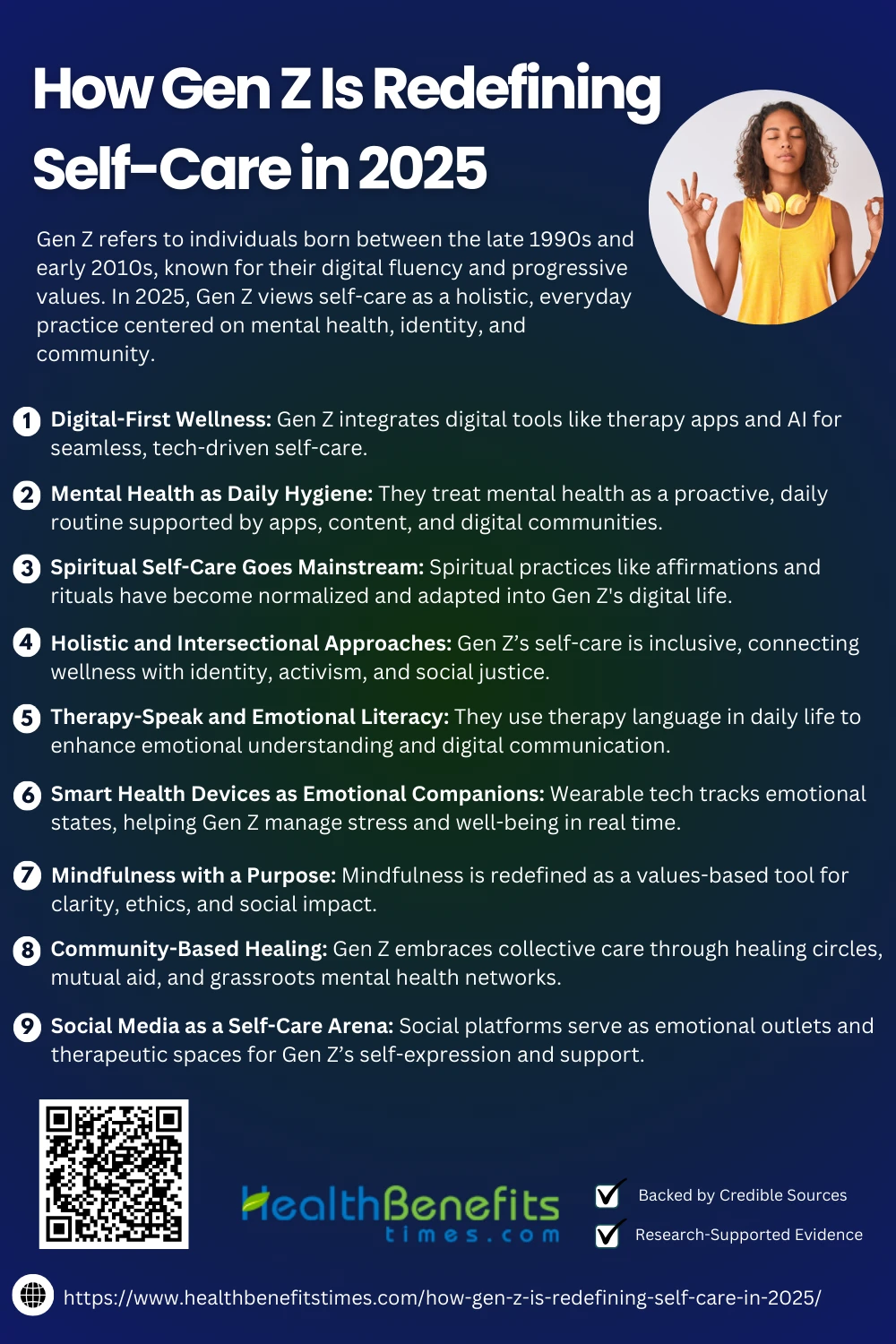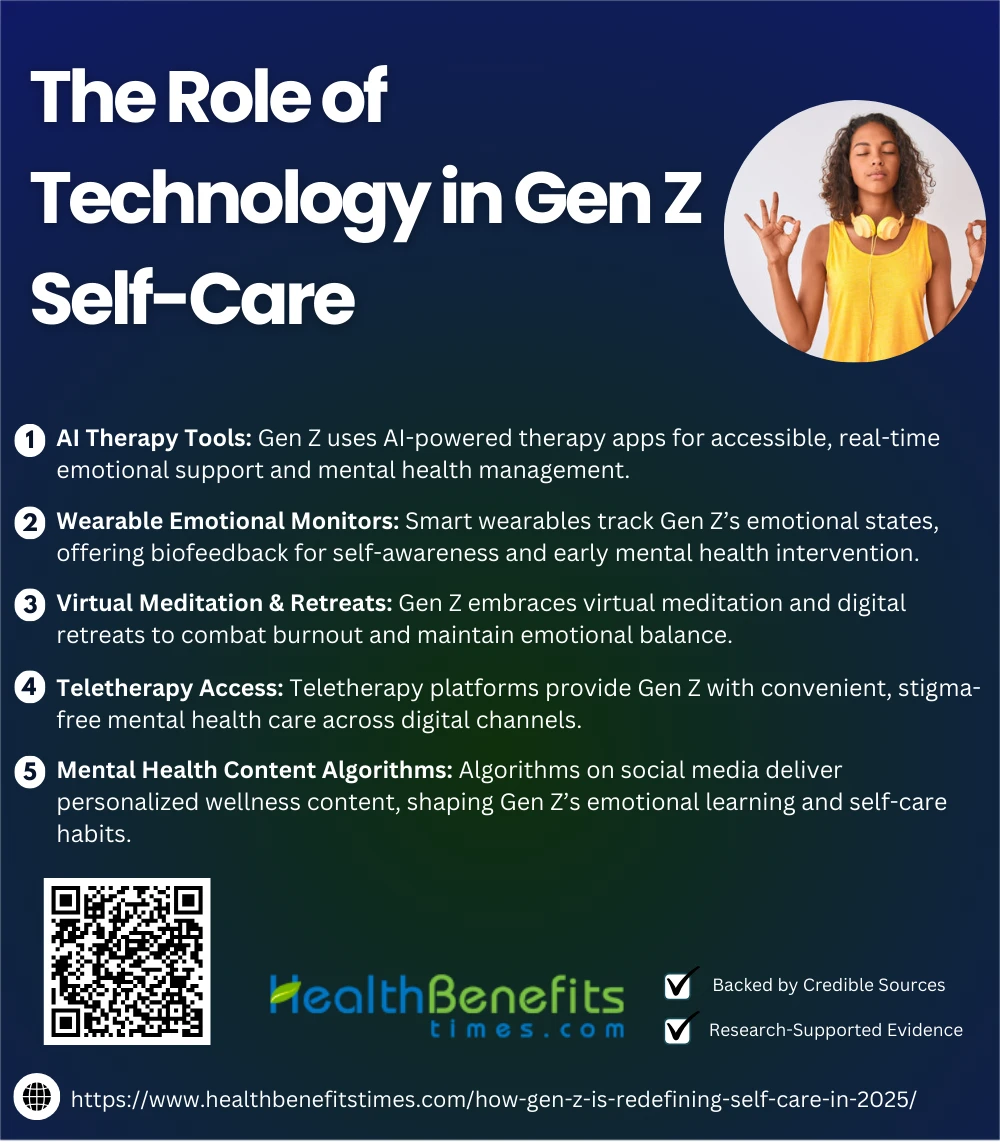- Gen Z refers to individuals born between the late 1990s and early 2010s, known for their digital fluency and progressive values.
- In 2025, Gen Z views self-care as a holistic, everyday practice centered on mental health, identity, and community.
- They are shifting the wellness conversation from luxury and aesthetics to authenticity, inclusivity, and digital balance.
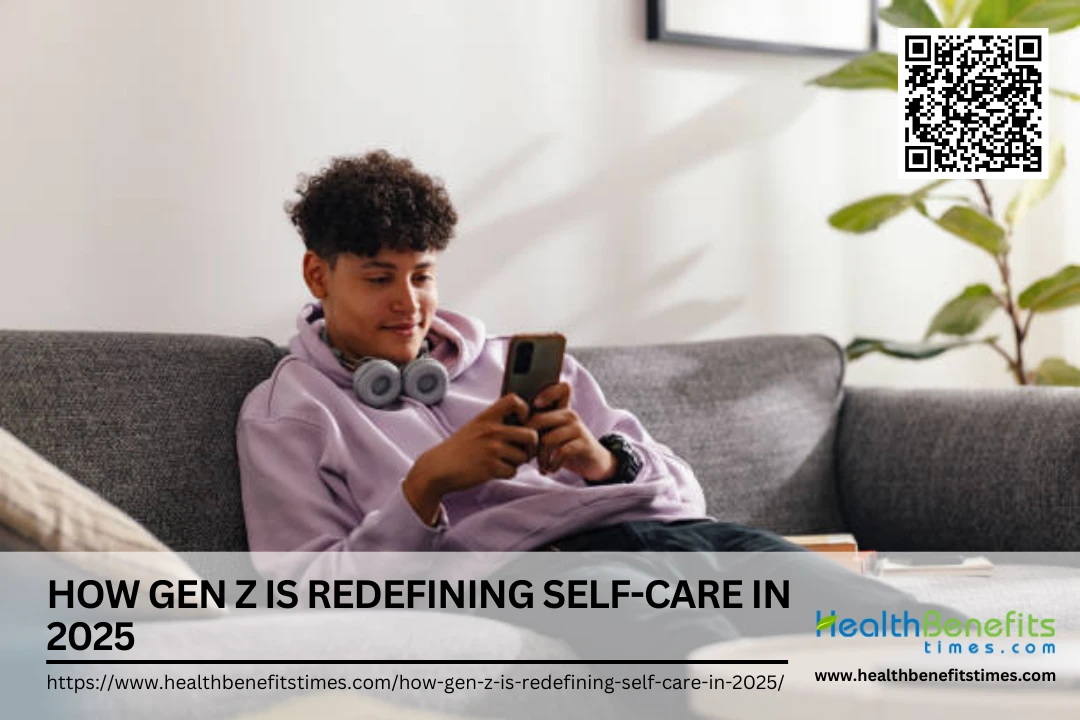 Self-care is defined as an individual’s ability to manage health by maintaining personal well-being, preventing illness, and coping with illness or disability—without direct medical intervention, often through physical, emotional, and social practices. In 2025, Gen Z is fundamentally reshaping the landscape of self-care, moving it from a commercialized wellness trend to a deeply integrated aspect of daily life that emphasizes authenticity, inclusivity, and mental sustainability. Unlike previous generations, Gen Z’s approach is more digitally native, decentralized, and socially conscious. They leverage AI-powered therapy apps, virtual meditation rooms, and neuro-divergent-friendly routines to support emotional well-being in a hyperconnected world. Their redefinition of self-care also includes political participation, boundary-setting content on social media, and a rejection of “toxic productivity” culture, demonstrating a preference for holistic, communal, and identity-based wellness frameworks. As Gen Z continues to advocate for destigmatizing mental health and embracing emotional realism, they are not only transforming how self-care is practiced, but also challenging institutions to keep pace with a more values-driven model of health.
Self-care is defined as an individual’s ability to manage health by maintaining personal well-being, preventing illness, and coping with illness or disability—without direct medical intervention, often through physical, emotional, and social practices. In 2025, Gen Z is fundamentally reshaping the landscape of self-care, moving it from a commercialized wellness trend to a deeply integrated aspect of daily life that emphasizes authenticity, inclusivity, and mental sustainability. Unlike previous generations, Gen Z’s approach is more digitally native, decentralized, and socially conscious. They leverage AI-powered therapy apps, virtual meditation rooms, and neuro-divergent-friendly routines to support emotional well-being in a hyperconnected world. Their redefinition of self-care also includes political participation, boundary-setting content on social media, and a rejection of “toxic productivity” culture, demonstrating a preference for holistic, communal, and identity-based wellness frameworks. As Gen Z continues to advocate for destigmatizing mental health and embracing emotional realism, they are not only transforming how self-care is practiced, but also challenging institutions to keep pace with a more values-driven model of health.
The Evolution of Self-Care
Self-care has long existed in varying forms, but its cultural weight has evolved drastically. Among Baby Boomers, it was largely reactionary—focused on physical rest or hobbies, often outside the context of mental health (Konstantinou & Attia, 2023). Millennials, shaped by rising burnout and digital life, brought self-care into mainstream culture as a means of managing anxiety and identity. (1)
A pivotal shift occurred as self-care transformed from an occasional indulgence to a critical tool for daily emotional regulation and mental hygiene, fueled by increased stress and public dialogue around psychological resilience. (2)
Today, Gen Z champions a multidimensional model that prioritizes emotional, digital, spiritual, and social well-being. Their wellness practices include app-based therapy, virtual retreats, identity-affirming rituals, and political engagement as acts of healing. (3) (4) (5) (6)
Core Trends Driving Gen Z’s Self-Care Revolution
In 2025, Gen Z is reshaping self-care into a dynamic, holistic lifestyle. Their approach blends mental health, tech-savvy tools, identity expression, and community connection to prioritize well-being like never before.
Gen Z’s self-care revolution is rooted in digital-first wellness, where therapy apps, AI-driven chatbots, and virtual meditation spaces replace traditional mental health channels. With tools like mood-aware wearables and online safe spaces, this generation integrates self-care seamlessly into their screenscapes, promoting accessibility and emotional tracking. (7) Emerging platforms personalize care delivery, while Gen Z’s affinity for gamified healing enhances commitment. (4) (5) This hybrid of tech and care signifies a generational shift. (6)
2. Mental Health as Daily Hygiene
For Gen Z, mental health is no longer crisis management but a form of daily hygiene. Burnout, anxiety, and identity stress are countered with routines like journaling, digital detoxing, and therapy check-ins. Emotional regulation is taught through TikTok, therapy memes, and self-awareness videos. (8) Apps for neurodivergent users normalize body doubling and shared accountability. (9) AI-guided support systems reduce stigma and offer immediate coping strategies. (10) These tools embody their shift toward proactive wellness. (11)
3. Spiritual Self-Care Goes Mainstream
For Gen Z, spiritual self-care is no longer fringe—it’s foundational. From astrology-based affirmations to TikTok manifestation rituals, digital platforms have become gateways to inner clarity and resilience. (7) Apps like Skylight now blend mindfulness and purpose-driven spirituality. (4) Young adults are also reshaping interfaith rituals to fit inclusive, secular identities. (12) This generation values embodied rituals that support healing beyond religion. (13) Even workplace wellness now includes contemplative practices. (14)
4. Holistic and Intersectional Approaches
Gen Z integrates emotional, physical, social, and cultural well-being into an intersectional self-care framework. Their model acknowledges how mental health intersects with race, gender, and identity. (15) Self-care becomes activism, especially in LGBTQ and BIPOC communities navigating systemic inequities (Boisclair, 2024). Practices like mutual aid and community “care webs” reinforce resilience. (16) Gen Z also embraces collective self-preservation through advocacy-oriented healing. (17) Counseling research even reframes wellness as a social justice tool. (18)
5. Therapy-Speak and Emotional Literacy
Gen Z has normalized therapy-speak—terms like “emotional labor,” “gaslighting,” and “setting boundaries” now populate everyday dialogue. These terms foster emotional literacy and reshape digital relationships. Social media platforms act as emotional classrooms, reinforcing trauma-informed language. Mental health awareness through storytelling and peer-led content is redefining how therapy is accessed and perceived. (8) (10) (11)
6. Smart Health Devices as Emotional Companions
Smartwatches and mood-tracking devices are emotional companions for Gen Z, providing real-time insight into stress, anxiety, and focus levels. (19) These tools offer nonverbal feedback loops for self-regulation. (20) Emotional biosensors embedded in wearable tech detect affective states before crises occur. (21) Gen Z increasingly adopts AI-driven health frameworks for preventive well-being. These technologies blend therapy with biofeedback seamlessly. (22)
7. Mindfulness with a Purpose
Mindfulness for Gen Z is no longer just about calm—it’s about clarity, social good, and values alignment. This generation adopts meditation to enhance executive focus and ethical living. (23) Purpose-driven mindfulness platforms now blend activism and neuroplasticity. (24) Leadership research links mindfulness with moral decision-making. (14) Spiritual practices are becoming workplace norms for Gen Z’s alignment with deeper purpose. Tech futurism frames meditation as design for collective well-being. (25)
8. Community-Based Healing
Gen Z’s self-care ethos is increasingly collectivist, rooted in community-based healing, mutual aid, and inclusive recovery networks. Healing circles and mutual support structures offer psychological safety. (26) Youth organizations foster resilience through communal emotional preparedness. (17) Ecodramatherapy engages activists in embodied self-care practices. (27) Black feminist health research shows how collective healing mitigates structural harm. (28) Public health strategies increasingly embed community coaches to support grassroots wellness. (29)
9. Social Media as a Self-Care Arena
For Gen Z, platforms like TikTok and Instagram are more than entertainment—they’re therapy extensions and emotional processing zones. Gen Z uses social media to share coping tools, narrate burnout stories, and validate emotional language. (30) Influencers now model self-care routines, transforming algorithmic content into emotional resources. Platforms act as healing spaces, especially for marginalized groups. These digital rituals normalize vulnerability and community resilience.
The Role of Technology in Gen Z Self-Care
Gen Z seamlessly integrates technology into self-care, using digital tools to support mental, emotional, and physical well-being. From AI therapy to mood-tracking apps, tech is central to their daily routines.
AI-driven therapy tools are transforming how Gen Z approaches mental health. Chatbots like Woebot and Wysa offer CBT-based emotional support, making therapy more accessible and stigma-free. These apps provide real-time coping strategies, reducing barriers to professional care. Many platforms now integrate mindfulness exercises, mood journaling, and crisis intervention in one digital space. (31)
2. Wearable Emotional Monitors
Smart wearable devices are emerging as powerful emotional allies for Gen Z, enabling real-time tracking of stress, mood, and emotional states. Tools like EmoTrack and AI-integrated smartwatches help detect subtle shifts in mental well-being. (32) These devices continuously collect biofeedback, aiding in mood prediction and early intervention. (33) AI-enhanced wearables now feature real-time journaling, alerts, and adaptive feedback. (22) Smart textiles have also entered the space, tracking physiological responses linked to anxiety and depression. (34) For Gen Z, emotional monitoring is not just passive data—it’s actionable self-awareness. (19)
3. Virtual Meditation & Retreats
Gen Z increasingly turns to virtual meditation and digital retreats for emotional restoration. VR-based mindfulness platforms simulate immersive healing environments. (7) Retreat apps offer guided audio journeys and communal rest rituals designed for overstimulated digital natives. (35) These tech-mediated retreats support burnout prevention and cognitive clarity in hyperconnected lives. (36)
4. Teletherapy Access
Teletherapy has become a cornerstone in Gen Z’s mental health care, offering convenient, stigma-free access to licensed professionals via apps and video platforms. (37) Digital tools empower real-time mental support for anxiety, depression, and trauma recovery. (38) With 24/7 availability, these platforms eliminate barriers to care across socioeconomic divides. (39)
5. Mental Health Content Algorithms
Gen Z increasingly depends on social media algorithms to surface relatable and therapeutic content. Platforms like TikTok and Instagram use recommender systems to deliver wellness posts, coping strategies, and therapy language in personalized feeds. (40) While these algorithms can enhance emotional literacy, they also shape perceptions of wellness in potentially biased ways. (41) Content moderation and amplification directly influence how Gen Z consumes and mimics self-care behaviors. (42)
Breaking the Myths: What Self-Care Isn’t for Gen Z
For Gen Z, self-care isn’t about luxury or trends—it’s about authenticity, sustainability, and emotional balance. They reject superficial routines in favor of meaningful practices that genuinely support mental well-being.
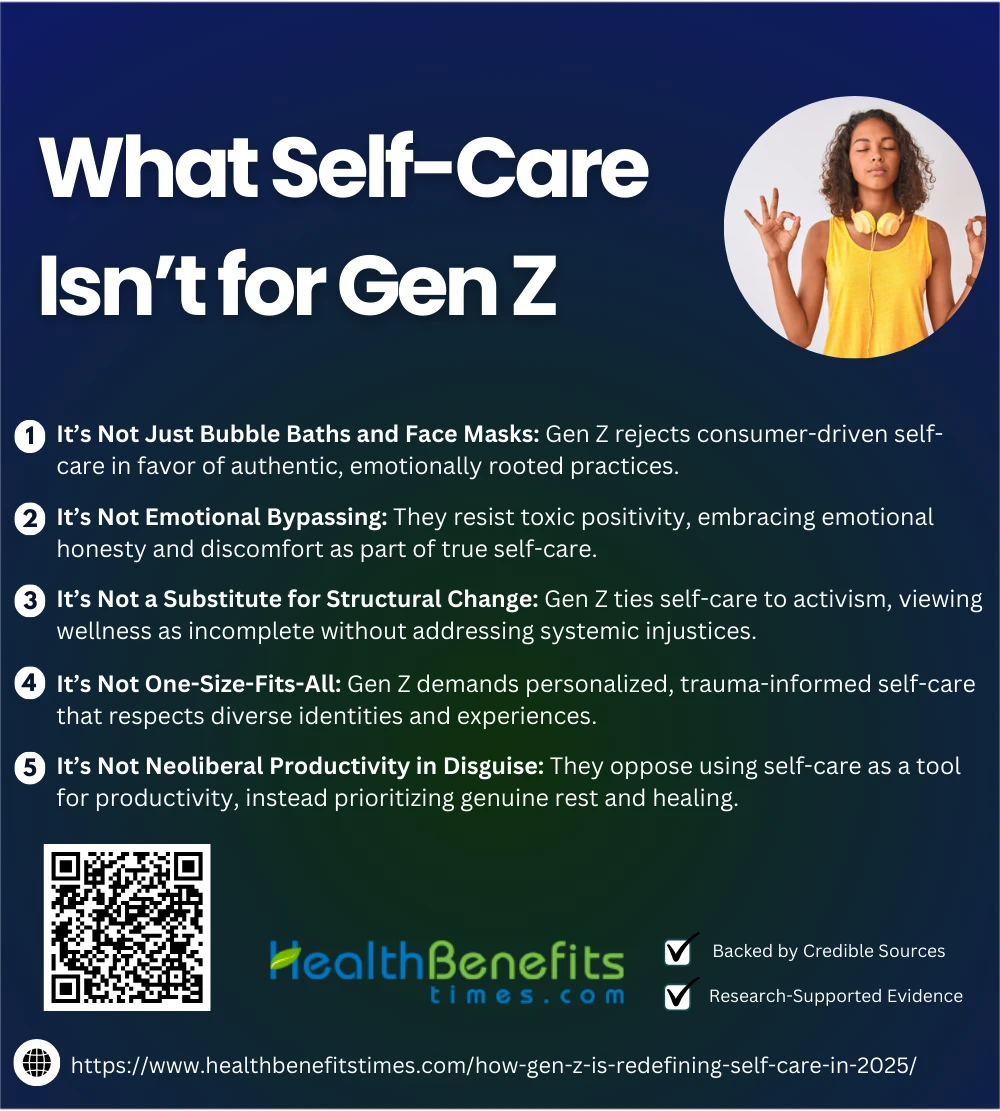 1. It’s Not Just Bubble Baths and Face Masks
1. It’s Not Just Bubble Baths and Face Masks
Gen Z increasingly rejects the superficial commercialization of self-care, often symbolized by skincare routines and scented candles. To them, reducing wellness to consumer products undermines deeper emotional and structural needs. This generation critiques the wellness industry for selling relaxation rather than cultivating resilience. (43) Their demand is for authenticity and identity-based care over Instagrammable rituals. (44)
2. It’s Not Emotional Bypassing
Gen Z firmly resists the misuse of self-care as a tool for suppressing negative emotions or enforcing toxic positivity. For them, authentic care includes naming grief, anxiety, and anger without spiritual bypassing or performative calmness. (45) Digital wellness discourse reinforces acceptance, not avoidance, of emotional discomfort. (46) They demand space for rawness—not curated resilience. (47)
3. It’s Not a Substitute for Structural Change
For Gen Z, self-care is not an escape from systemic inequality. They challenge neoliberal narratives that individualize well-being while ignoring racism, classism, and ableism. (48) Young activists integrate care with collective action and policy advocacy. (49) Many emphasize that wellness without justice is incomplete. (50)
4. It’s Not Neoliberal Productivity in Disguise
Gen Z pushes back against self-care used as a productivity hack—where rest is valuable only if it leads to optimized performance. They critique the capitalist co-optation of wellness as a tool to maintain efficiency, not healing. (51) Academic analyses show how mindfulness gets rebranded to serve corporate goals. (25) For Gen Z, self-care must resist exploitation, not enable it. (48)
5. It’s Not One-Size-Fits-All
Gen Z insists that self-care must honor identity, trauma histories, and neurodivergence—not follow generic templates. They demand intersectional practices tailored to their lived experiences. (52) Research supports shifting from rigid wellness models to trauma-informed, customizable care. (53) Gen Z’s push toward individualized support strategies redefines how care frameworks are designed. (54)
What Older Generations Can Learn from Gen Z
Older generations can gain valuable insights from Gen Z’s self-care habits—prioritizing mental health, embracing vulnerability, using technology mindfully, and fostering community-driven wellness over individualistic, appearance-focused self-care traditions.
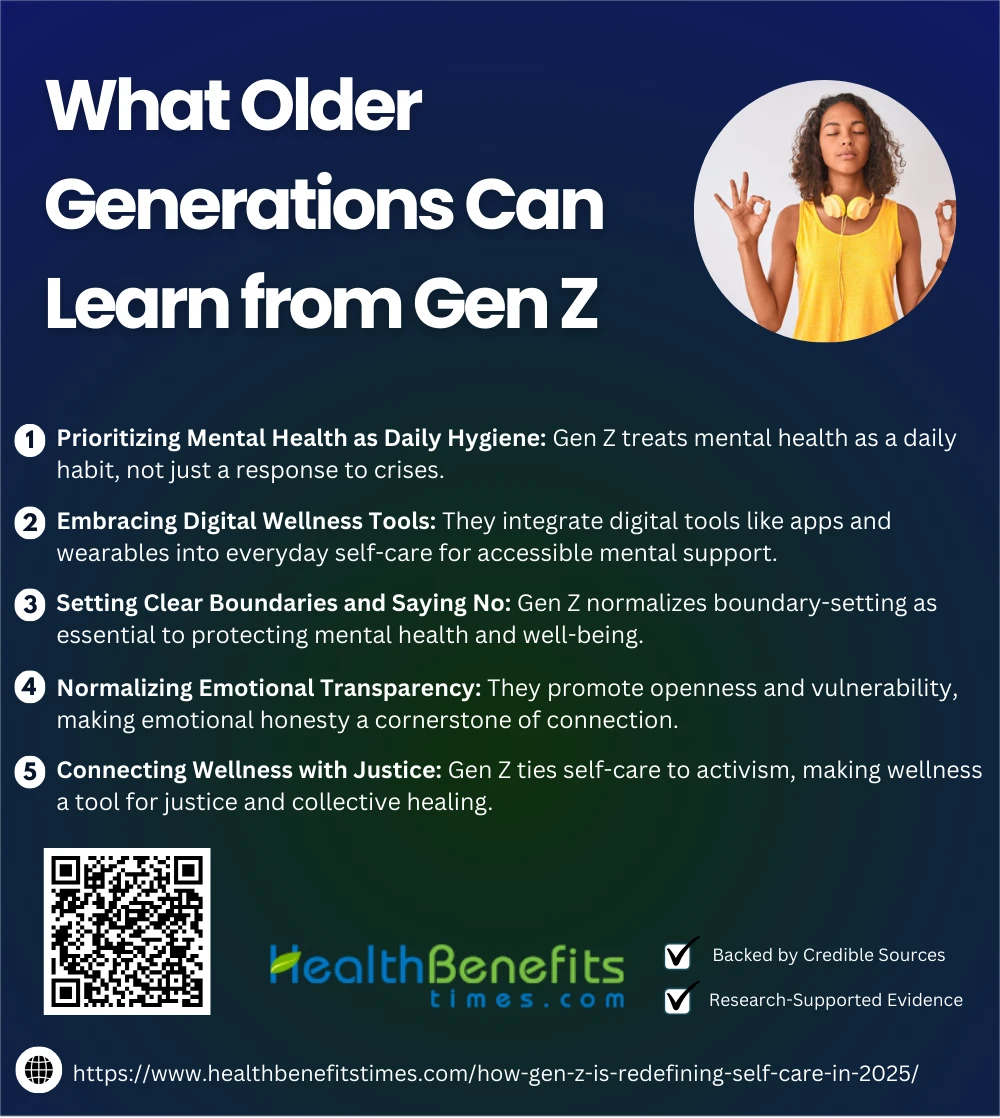 1. Prioritizing Mental Health as Daily Hygiene
1. Prioritizing Mental Health as Daily Hygiene
Gen Z embraces mental health not as crisis management but as part of daily maintenance—similar to brushing teeth or exercising. They normalize therapy, journaling, and mindfulness as essential habits. (47) Their routines focus on proactive resilience through structured self-reflection. This shift offers older generations a model of consistent, stigma-free care. (55)
2. Embracing Digital Wellness Tools
Gen Z seamlessly integrates digital tools into self-care routines, from mindfulness apps to AI-driven wellness trackers. Apps like Headspace and Calm are now foundational, not supplemental. (56) Smartwatches also play a role in tracking mood and encouraging healthy habits. (57) This generation’s fluency with digital mental health platforms is shaping a more accessible model of self-care. (58)
3. Setting Clear Boundaries and Saying No
Gen Z values psychological safety through clear boundary-setting in work, relationships, and digital life. Unlike older models that valorize overwork, this generation normalizes saying no as an act of mental preservation. (59) Their approach to work-life balance includes “quiet quitting” and time-bound digital disengagement. (11) They redefine self-care as selective engagement, not constant availability. (60)
4. Normalizing Emotional Transparency
Gen Z champions open emotional expression, normalizing vulnerability through therapy-speak and online storytelling. They have destigmatized sharing mental health struggles across digital spaces like TikTok and YouTube. (42) This authenticity empowers others to express rather than suppress emotion. Their candor builds community and resilience in an era of digital vulnerability. (61)
5. Connecting Wellness with Justice
Gen Z frames wellness as inseparable from social justice, viewing self-care not as escapism but as activism itself. Studies show their mental health practices often align with identity-based healing and racial equity efforts. (62) Many young people prioritize culturally responsive therapy models, especially in marginalized communities. (63) Their activism promotes collective well-being, not individual optimization. (64) This ethos redefines wellness as a communal right rather than a personal luxury and emphasizes intersectional solidarity across mental, social, and political spheres. (65) (66)
Conclusion
In 2025, Gen Z is transforming the definition of self-care into something far more intentional, inclusive, and holistic. Unlike previous generations that often viewed self-care as indulgent or superficial, Gen Z embraces it as a daily necessity rooted in mental health, identity expression, and community support. They prioritize authenticity over aesthetics, focusing on emotional well-being, digital balance, and sustainable practices. Fueled by social media, technology, and a desire for genuine connection, this generation is breaking down stigmas and reshaping wellness culture. Their version of self-care is not just personal—it’s political, practical, and deeply integrated into everyday life.


